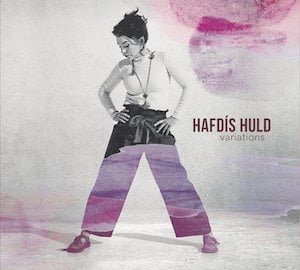 Hafdis Huld – Variations
Hafdis Huld – Variations
Red Grape – 8 February 2019
For her fifth album, the Icelandic alt electro-folk-pop singer Hafdís Huld follows in the footsteps of many artists before her in offering up her interpretations of others’ songs, teasing out the darkness sometimes hidden behind the production. Working with Alisdair Wright on instrumentation and backing vocals, it’s an eclectic genre-crossing selection, opening with a mix of Appalachian mandolin, guitar, and throbbing and circling percussive rhythms on a moody version of Dolly Parton’s The Bargain Store and then trampolining into Whitney territory for a fragile, acoustic dappled reading of One Moment In Time that exposes the almost desperate need to be ‘special’.
John Deacon’s songwriting contribution to Queen is often overlooked, but he was responsible for one of their biggest hits, I Want To Break Free, here given a simple, echoey piano and cello arrangement, the tempo slowed down to an introspective, emotionally torn ballad breathily sung by Huld that gradually builds to a swelling climax before its dying fall.
One of the lesser-known numbers (unless you’re a Father Ted fan), Songs of Love appeared on the 1996 Divine Comedy album, Casanova and provided the theme song of the aforementioned TV comedy, twinkling acoustic fingerpicking accompanying it along its light waltzing path.
Without a doubt, the most off the wall choice has to be You’re The First, The Last, My Everything, Barry White’s heavily orchestrated disco classic magically transformed into a softly sung, fingerpicked airy folk tune that exchanges the original’s bedroom bluster for vulnerability.
Another soul classic gets a folksy makeover with a disarmingly gorgeous treatment of Tina Turner hit Simply The Best stripped back to the bare bones with her voice and acoustic guitar joined by muted bass drum and shimmering keys midway.
It’s a brave soul who tackles First Time Ever I Saw Your Face, the stark Ewan McColl love song to Peggy Seeger forever defined by Roberta Flack. Wisely, Huld doesn’t attempt to fix what isn’t broken, simply replacing the string backing with a melancholic resonant guitar.
Taken at a much slower pace but, arguably, with a more dramatic, reverb-laced production than the original, Eurythmics’ Here Comes The Rain Again is recast to again expose the dark emotional desperation and the balance of desire and resignation in the lyrics.
From a major international hit to another lesser known number, Slow Learner is pretty faithful to the Boo Hewardine original from his 2005 Harmonograph album, but her reflective delivery actually has a fuller arrangement, almost with a Galaxie 500 feel.
It’s back to fingerpicked guitar for Berlin’s Top Gun chart topper Take My Breath Away, although it does nod to the original’s distinctive drum sound, adding tambourine for extra colour. However, while attractive enough, in never finding the climax, it’s probably the least effective of the reworks.
Dance music gets its turn with a striking, slow dramatic ballad spin on Haddaway’s 1993 hi-energy club filler What Is Love, the underlying melody line having an almost dark country lope to it. She stays on the dance floor and introduces banjo into a dream pop take on The Real Thing’s You To Me Are Everything, though, again, it doesn’t actually stray that far from the original, before closing with Loudon Wainwright’s The Swimming Song, a number, which, unless you go all radical, is hard to shake out of its already simple strummed guitar musical comfort zone. Wheezing accordion gets a solo, but it’s probably best appreciated as an affectionate tribute rather than an actual variation.
Like last year’s Folk Fever album, Variations is a reminder of just how flexible music can be in the hands of an artist who sees genre boundaries as a challenge rather than confinement.
